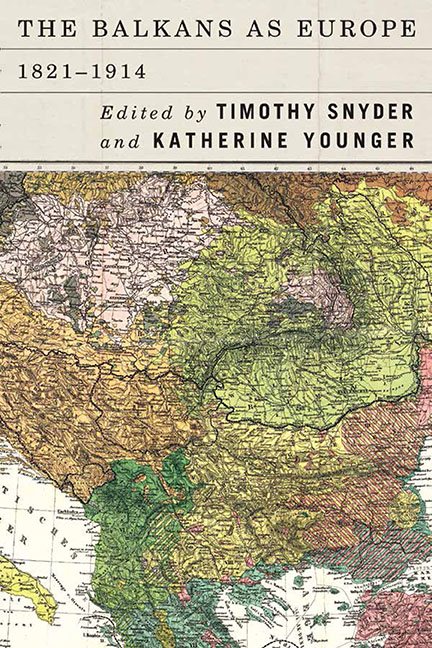Book contents
- Frontmatter
- Contents
- A Note on Terminology
- Maps
- Introduction
- 1 Balkan Initiatives to Make Europe: Two Cases from Mid-Nineteenth-Century Dalmatia
- 2 The Homeland as Terra Incognita: Geography and Bulgarian National Identity, 1830s–1870s
- 3 Liberation in Progress: Bulgarian Nationalism and Political Economy in a Balkan Perspective, 1878–1912
- 4 Emigrants and Countries of Origin: The Politics of Emigration in Southeastern Europe until the First World War
- 5 The Quiet Revolution: Consuls and the International System in the Nineteenth Century
- 6 The Hollow Crown: Civil and Military Relations during Serbia's “Golden Age,” 1903–1914
- List of Contributors
- Index
- Rochester Studies in East and Central Europe
6 - The Hollow Crown: Civil and Military Relations during Serbia's “Golden Age,” 1903–1914
Published online by Cambridge University Press: 17 July 2019
- Frontmatter
- Contents
- A Note on Terminology
- Maps
- Introduction
- 1 Balkan Initiatives to Make Europe: Two Cases from Mid-Nineteenth-Century Dalmatia
- 2 The Homeland as Terra Incognita: Geography and Bulgarian National Identity, 1830s–1870s
- 3 Liberation in Progress: Bulgarian Nationalism and Political Economy in a Balkan Perspective, 1878–1912
- 4 Emigrants and Countries of Origin: The Politics of Emigration in Southeastern Europe until the First World War
- 5 The Quiet Revolution: Consuls and the International System in the Nineteenth Century
- 6 The Hollow Crown: Civil and Military Relations during Serbia's “Golden Age,” 1903–1914
- List of Contributors
- Index
- Rochester Studies in East and Central Europe
Summary
The Balkans played a sensational—if not always fully understood—part in the outbreak of the First World War. When, in June 1914, a Bosnian Serb nationalist shot and killed the Habsburg heir, Archduke Franz Ferdinand, and his wife, Sophie Chotek, Duchess of Hohenberg, he also delivered to Austria- Hungary a casus belli against its regional rival, Serbia. But the consequent diplomatic crisis turned this Balkan imbroglio between Austria-Hungary and Serbia into a Europe-wide concern. During the “July days” that followed the assassination, Europe's leaders activated a series of interlocking military mobilizations and counter-mobilizations, thereby triggering, in the space of barely a month, a global conflict unprecedented in its destructive capacities, the first war to be called a “world war. The rival armies dashing toward the Belgian coast in August 1914, the static sinews of trenches cut into the soil of Flanders, the besieged fortresses of Galicia, the Battles of the Marne, Verdun, Tannenberg, Caparetto, and Gallipoli—Princip is often presented as the hapless “trigger” of all this, a mere pretext for the warring rivalries of the European great powers to break out into hostilities. Thus are the Balkans relegated to the periphery of Europe once again.
Explosive events garner more attention than slow-burning historical processes. The history of the prewar era in Europe was pockmarked with minor eruptions from the Balkan “powder keg.” The region was the Gordian knot of that taxing diplomatic entanglement of the late nineteenth century, the great Eastern Question, which begged an answer from the European powers as to how best to manage the obvious decline of the Ottoman Empire. Informed observers in 1914 would also have recalled an earlier sensational regicide in these parts: that of Aleksandar Obrenović, the ruling Serbian monarch, in a palace coup in Belgrade in 1903. The grisly details of this killing had shocked Europeans. So, too, had the atrocities carried out by the national armies of the Balkan alliance (Serbia, Montenegro, Greece, and Bulgaria) in the Balkan wars of 1912–13. (These conflicts were soon eclipsed by the First World War itself, but for a brief time they were front-page news throughout much of Europe, and were the subject of a detailed and assiduously compiled report commissioned by the Carnegie Endowment for International Peace.) Few Europeans, however, properly understood Balkan affairs in the years before 1914.
- Type
- Chapter
- Information
- The Balkans as Europe, 1821–1914 , pp. 139 - 160Publisher: Boydell & BrewerPrint publication year: 2018



